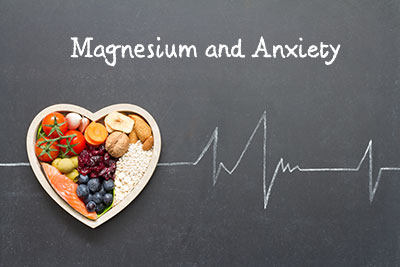 Doctors have been researching eating foods with magnesium to combat anxiety since the 1920s. At that time, researchers noted that diets low in magnesium were found to increase anxiety-related behaviors while foods naturally rich in magnesium helped people to feel calmer.
Doctors have been researching eating foods with magnesium to combat anxiety since the 1920s. At that time, researchers noted that diets low in magnesium were found to increase anxiety-related behaviors while foods naturally rich in magnesium helped people to feel calmer.
Research has found that magnesium may help with brain functions that reduce stress and anxiety. Magnesium affects a part of the brain called the hypothalamus, which helps regulate the pituitary and adrenal glands. These glands are responsible for our response to stress. This may explain why magnesium deficiency has been associated with increased anxiety.
If you have an anxiety disorder, you might want to consider eating foods high in magnesium. To ensure you have enough magnesium in your diet, try eating the following foods:
- Fruit (figs, avocado, banana, raspberries)
- Vegetables (peas, broccoli, cabbage, green beans, artichokes,
asparagus, Brussels sprouts) - Leafy greens (kale, spinach, collard greens, turnip greens, mustard
greens) - Nuts (almonds, sunflower seeds, Brazil nuts, cashews, pine nuts,
flaxseed, peanuts, pecans) - Seeds (sunflower, pumpkin, chia, flax)
- Legumes (black beans, chickpeas, edamame, kidney beans)
- Seafood (salmon, mackerel, tuna)
- Whole grains (whole wheat, quinoa)
- Dark chocolate
Habitually low intakes of magnesium induce changes in biochemical pathways that can increase anxiety over time. Too much magnesium from food does not pose a health risk in healthy individuals because the kidneys eliminate excess amounts in the urine. However, high doses of magnesium from dietary supplements or medications often result in diarrhea that can be accompanied by nausea and abdominal cramping.
A large part of the reason why magnesium helps anxiety is because it reduces your body’s overall alkalinity. An alkaline diet increases intracellular magnesium and has been found to help people with anxiety.
If you consume too much acidic foods your body’s overall pH becomes acidic and can result in something called “chronic low-grade acidosis,” a condition associated with anxiety disorders. The good news is that well balanced diets consisting of naturally occurring magnesium tend to make the body more alkaline and reduce anxiety.
Dr. Randi Fredricks, Ph.D.
Author Bio
Dr. Randi Fredricks is a leading expert in the field of mental health counseling and psychotherapy, with over three decades of experience in both research and practice. She holds a PhD from The Institute of Transpersonal Psychology and has published ground-breaking research on communication, mental health, and complementary and alternative medicine. Dr. Fredricks is a best-selling author of books on the treatment of mental health conditions with complementary and alternative medicine. Her work has been featured in leading academic journals and is recognized worldwide. She is actively involved in developing innovative solutions for treating mental health. To learn more about Dr. Fredricks’ work, visit her website: https://drrandifredricks.com
References
Boyle, N. B., Lawton, C., & Dye, L. (2017). The Effects of Magnesium Supplementation on Subjective Anxiety and Stress-A Systematic Review. Nutrients, 9(5), 429.
Singewald N., Sinner C., Hetzenauer A., Sartori S.B., Murck H. Magnesium-deficient diet alters depression- and anxiety-related behavior in mice—Influence of desipramine and Hypericum perforatum extract. Neuropharmacology. 2004;478:1189–1197.
Spasov A.A., Iezhitsa I.N., Kharitonova M.V., Kravchenko M.S. Depression-like and anxiety-related behaviour of rats fed with magnesium-deficient diet. Zhurnal Vysshei Nervnoi Deyatelnosti Imeni I P Pavlova. 2008;584:476–485.
Jacka F.N., Overland S., Stewart R., Tell G.S., Bjelland I., Mykletun A. Association between magnesium intake and depression and anxiety in community-dwelling adults: The Hordaland Health Study. Aust. N. Z. J. Psychiatry. 2009;431:45–52.
Poleszak E., Szewczyk B., Kedzierska E., Wlaz P., Pilc A., Nowak G. Antidepressant- and anxiolytic-like activity of magnesium in mice. Pharmacol. Biochem. Behav. 2004;78:7–12.

